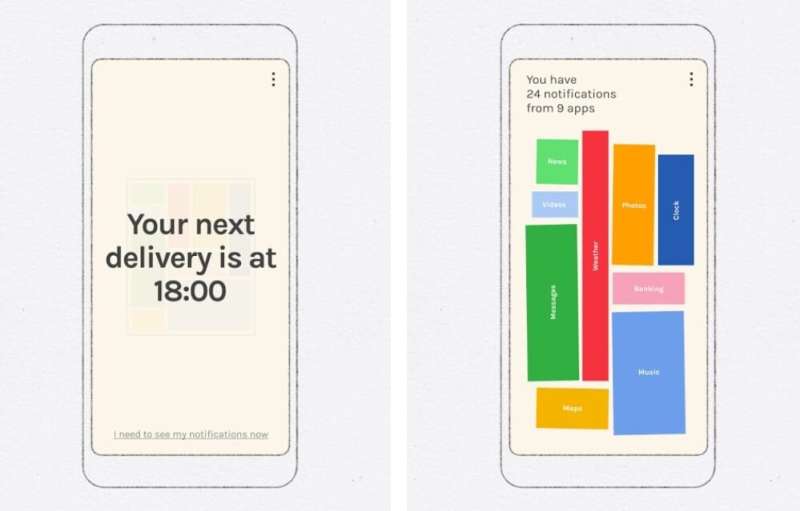Unlock Clock. We Flip. Desert Island. Post Box. Are these some new children's games to keep them busy on your smartphones while you're looking for parking? No way. Google has released activities that form something called the Digital Wellbeing Experiments. The latter is a platform that Google said is "to share ideas and tools that help people find a better balance with technology."
The company launched new Digital Wellbeing Experiments and are available as apps. "Great technology should improve life. Not distract from it." That is Google's high-road mantra that underpins the experiments. They have come up with ideas, they said, that help you find a balance right for you—how to enjoy the digital world without compromising your enjoyment of the real world.
Don't laugh. Addiction to digital devices where the next notification or celebrity breakup scroll is more important than anything going on in your room is not just some complaint by aunties whining about the young generation. It's, well, an addiction.
Robert Glatter, MD, in 2018 wrote about it in Forbes.
The pings and rings that identify an incoming text, mail or breaking story—the constant dopamine stimulation from our devices— leaves us "addicted and curious, and unable to disregard incoming texts and emails." Once, twice, 10 times, is not enough.
"The end result of this electronic urge leads to a preoccupation with, and need to reinforce this electronic high." He, actually, was calling attention to a paper than had appeared in NeuroRegulation, a journal. The heaviest smartphone users exhibited the greatest degree of depression, anxiety and loneliness and isolation.
"The behavioral addiction of smartphone use begins forming neurological connections in the brain in ways similar to how opioid addiction is experienced by people taking Oxycontin for pain relief— gradually," explained Erik Peper, one of the authors, in a news release.
With the new Digital Wellbeing Experiments, Post Box is introduced as an experimental app that minimizes distractions. Choose the time you want to get notifications to go through. (You have 24 notifications for 9 apps, for example.)
Desert Island challenges you to go a day with a handful of essential apps. Pick the apps most important to you. See how you did and even go again with one less app. It stops all notifications and bundles them together to be delivered at specific times (up to four) every day.
Still another app can help you see how often you check your device and how much you rely on it.
Rita El Khoury, Android Police, wrote that "Google is likely testing the waters with these strategies and seeing which ones work and where it can improve before implementing them in its main Digital Wellbeing app." After all, this is the company's "experiments" program, with getting-started resources for designers and developers, to try out ideas.
The platform provides "health-related tools," in that they may help users manage the time they spend digitally and ease the anxiety of digital interruptions they find hard to resist while on the job. Last year, Michael Coren in Quartz explored the platform goals and said CEO Sundar Pichai called the platform "JOMO," for the "joy of missing out"—as opposed to "FOMO," fear of missing out.
Coren in went deeper into the mindset of Google at the time and came up with a hard-to-forget insight that Digital Wellbeing was "an attempt by Google to convince people to moderate their use of its products and services. Not entirely, of course, but in small and subtle ways that curb their addictive, destructive tendencies. The move 'may stop a long-term backlash,' said one developer attending I/O." Backlash?
Coren added that "Digital Wellbeing is Google's public attempt to differentiate itself before the reckoning."
In addition to the apps, Google offered an option introduced as the Paper Phone. The goal is for you to have a "digital detox." For this, you choose a set of apps you think you will need throughout the day. Neowin: The apps are printed on a paper sheet.
So, there, you are printing a personal booklet of information, e.g., contacts, maps and meetings, printed directly to a sheet of paper. These "paper apps," for example, could be recipes, phrasebooks and notepads to let you get things done (or unwind) in a focused way.
More information:
experiments.withgoogle.com/unlock-clock
experiments.withgoogle.com/post-box
experiments.withgoogle.com/desert-island
experiments.withgoogle.com/morph
experiments.withgoogle.com/we-flip
play.google.com/store/apps/det … eriments.unlockclock
play.google.com/store/apps/det … gexperiments.postbox
play.google.com/store/apps/det … ngexperiments.weflip
play.google.com/store/apps/det … riments.desertisland
play.google.com/store/apps/det … ingexperiments.morph
© 2019 Science X Network























